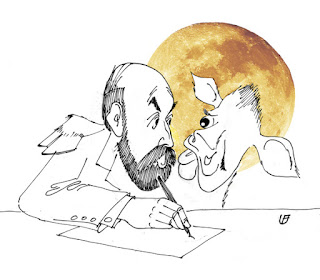|
This is a post I should have written in March 2014 to mark the 100th anniversary of Christian Morgenstern's death. But I missed the opportunity and must be content with this belated homage.
Morgenstern (1871-1914) was a German humorist (yes, such creatures exist!) attuned to the oddities of life. Especially the idiosyncrasies of German and its use inspired many of his poems: For example, he deliberately used bad rhymes for comic effect or to gently mock the rhyming conventions of poetry1; he spun funny stories from figures of speech taken literally; he described invented creatures with names he got by fooling around with the names of existing ones; and in the introduction to a collection of his poems, he skewered the impenetrability of German academic prose. Since all of this is so tightly bound to a particular language, it's basically untranslatable. One may have better luck with poems that simply tell a story without linguistic tricks, and that's what I tried with my translation of Morgenstern's poem Der Hecht (The Pike), which can be read as poking fun at vegetarians, or religious orthodoxy, or both (see illustration on the right). The link below will lead you to the German original together with a literal translation and a rhyming Nachdichtung. Der Hecht: Original and Translations _______________ 1He shares this predilection with Wilhelm Busch (1832-1908), another master of German comic verse. |
St. Anthony preaching to the pike family |
Addendum (one day later): Since I posted this, I discovered a poem that (a) illustrates Morgenstern's penchant for taking figures of speech literally; and (b) uses a phrase that has an almost exact equivalent in English, a happy coincidence that motivated me to attempt a translation. And so I added Die beiden Esel to the first poem: Die beiden Esel (The Two Asses): Original and Translations Addendum 2 (Nov. 25, 2015): I tried my hand at a third poem, Der Lattenzaun, dear to me because an architect plays a leading role: Der Lattenzaun (The Picket Fence): Original and Translations Addendum 3 (Dec. 3, 2015): It seems I'm on a roll: Das aesthetische Wiesel (The Aesthetic Weasel): Original and Translations |
The moon calf talking to Morgenstern about the aesthetic weasel |
Cantonese is both very cool and very old
1 day ago





5 comments:
This is a wonderful drawing and a fabulous translation. Translating is so much harder than people realize and yours is just terrific. Especially when one looks at the literal translation, it's easy to see how bad the translation could have been. Instead, it's witty and fun.
Since I'm the wife, I normally don't say anything about your blog posts. But I have to agree with Heika on this one; the drawing and the translation are fabulous. I just adore the faces of the pikes, all three of them listening with very focused attention, even the baby pike. And the translation is really great. How you managed to make everything rhyme so nicely is beyond me. I think you are a genius. But i am prejudiced.
Heartfelt thanks to both of you!
If I had come across your translations of these poems without seeing the name of their German author, I might have thought that they were by one of the English writers of nonsense verse: they have that same inspired silliness. My favorite is "The Picket Fence," which most exemplifies that quality.
I love the whole absurd sequence of the poem, from the discovery of the defective fence, to the meddling architect, to the reaction of the public, to the Senate's confiscation of the fence, and, finally, the architect's retreat to (in the delightfully silly last line) "Afri- or Americay." And, as always, I was impressed by your ability to capture the tone and meaning of the work in your accompanying drawing (in this case of "The Pike"), which is a perfect visual interpretation of the poem.
Esther: Many thanks to you, too!
Post a Comment